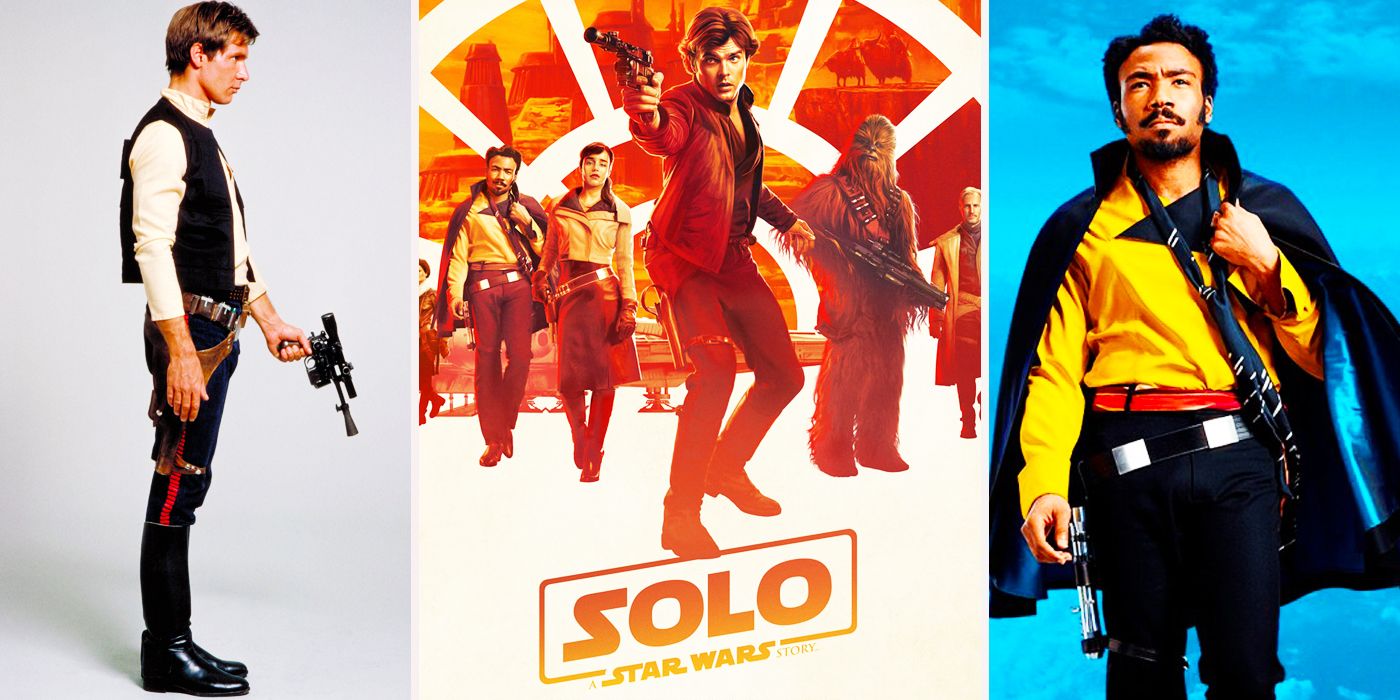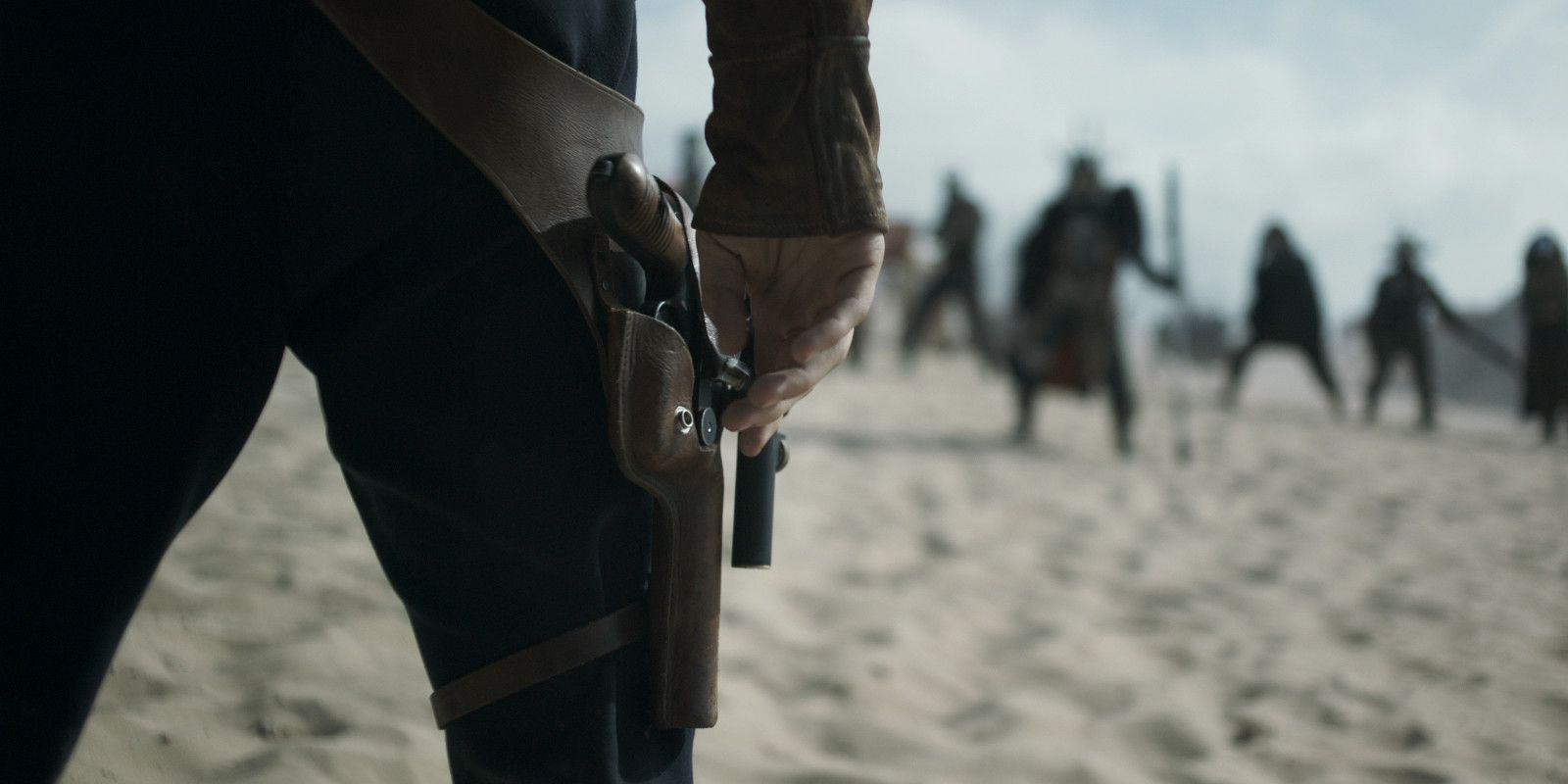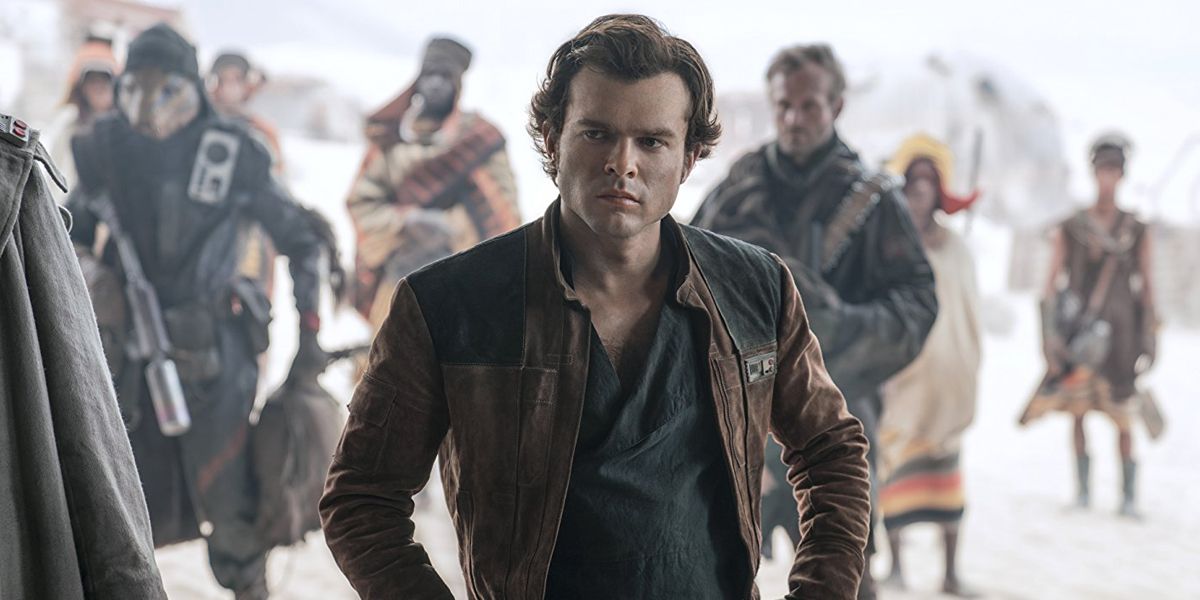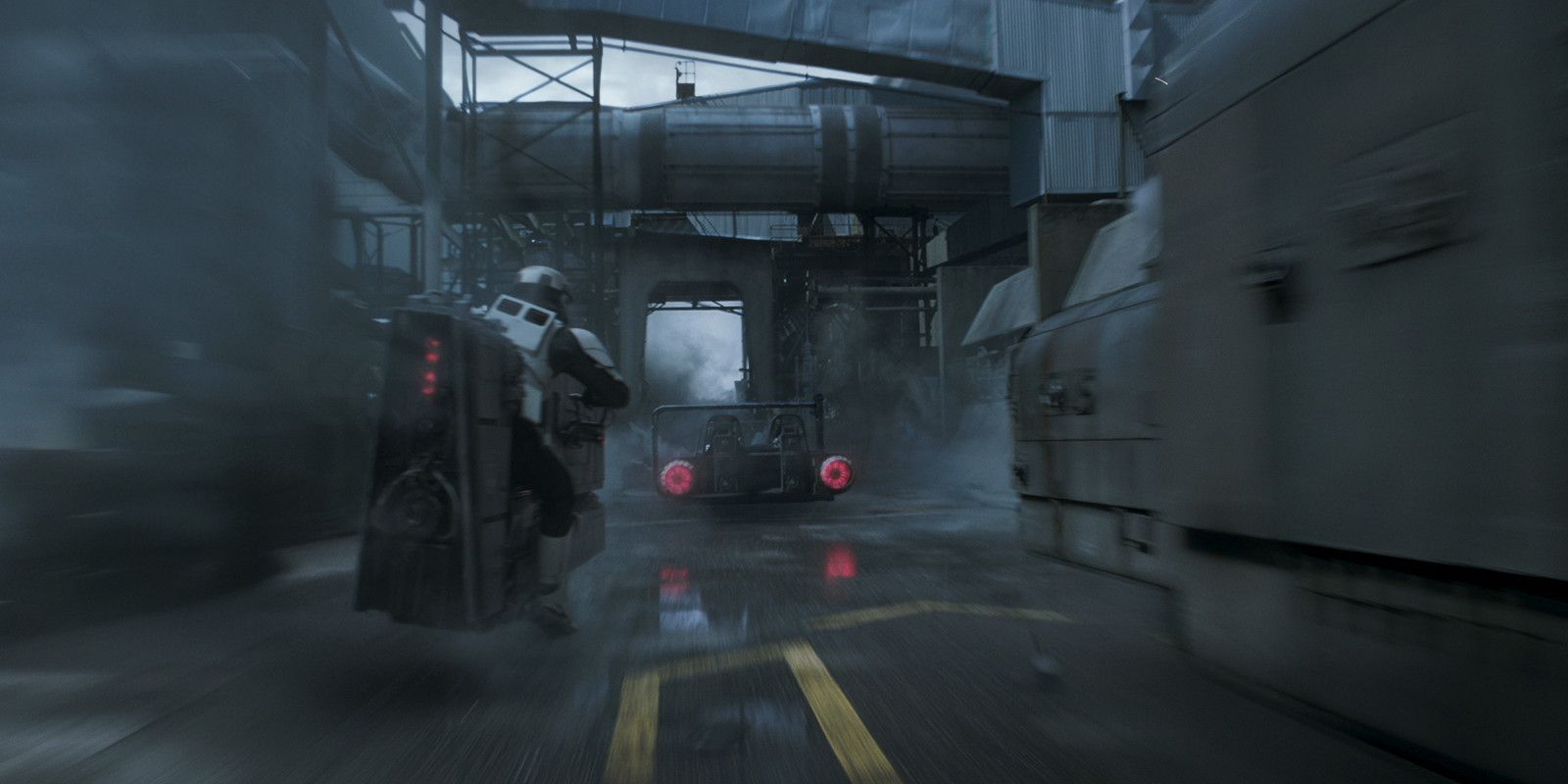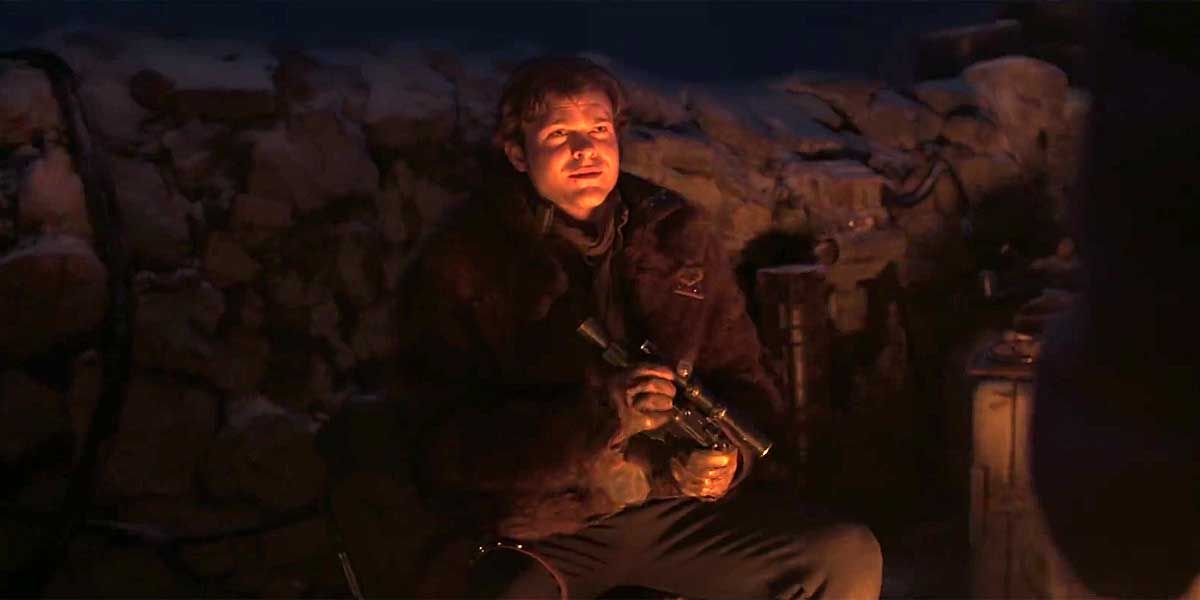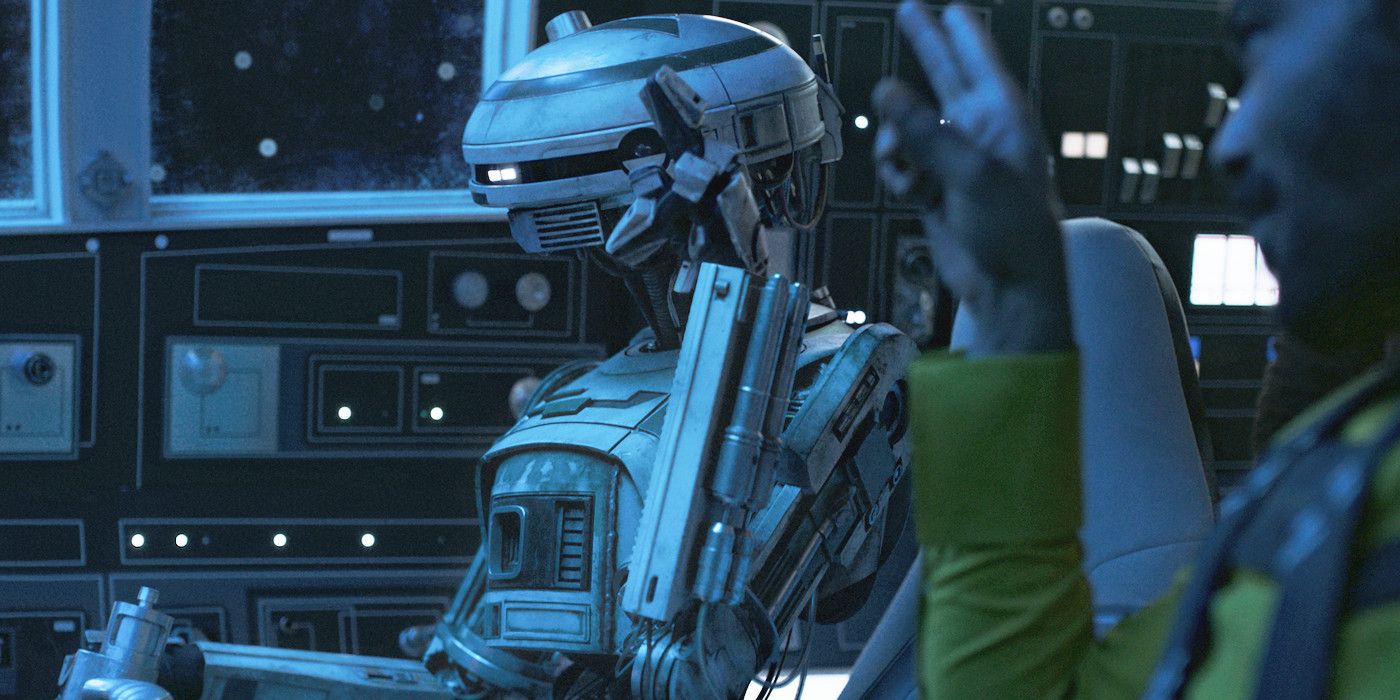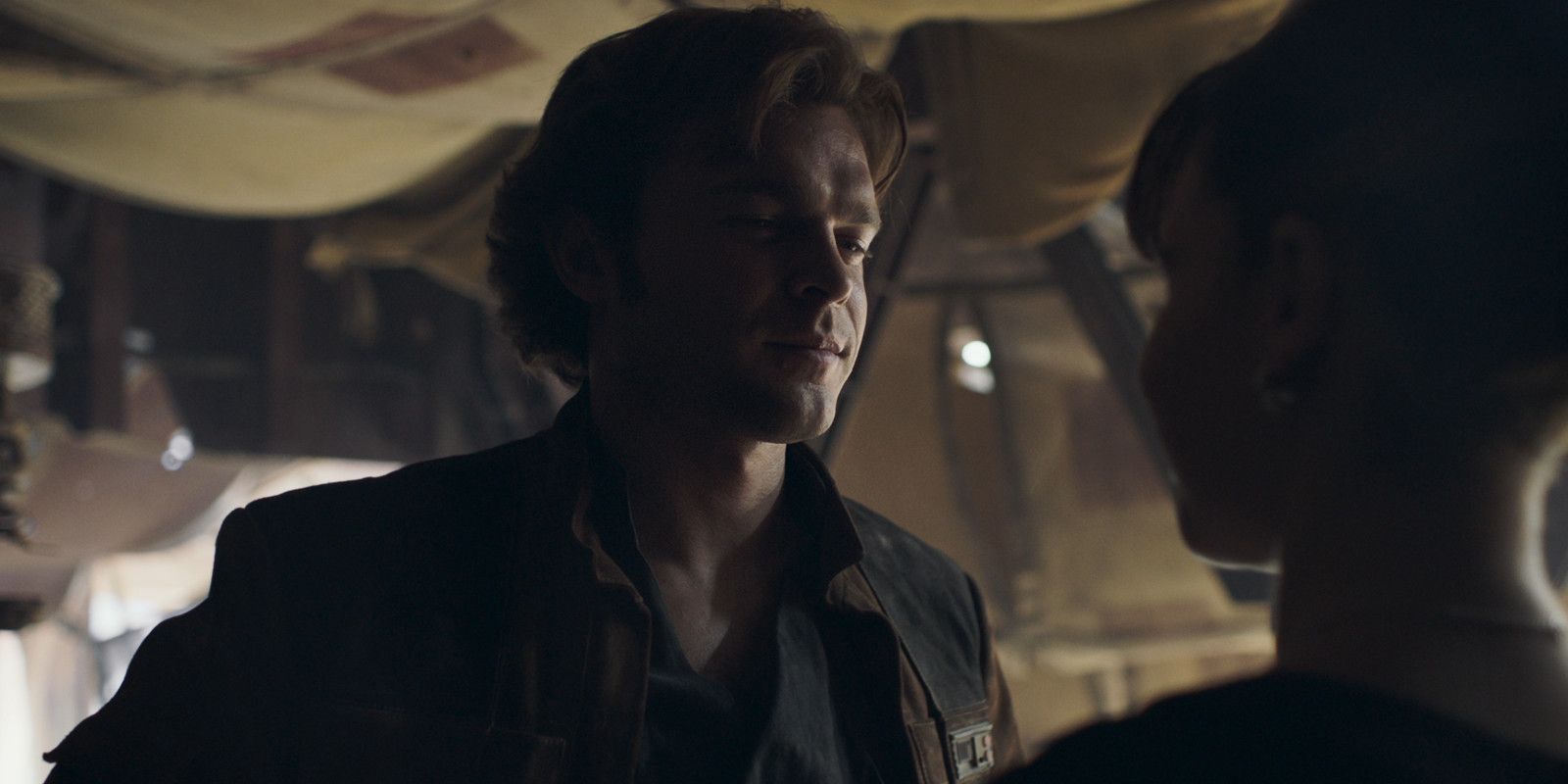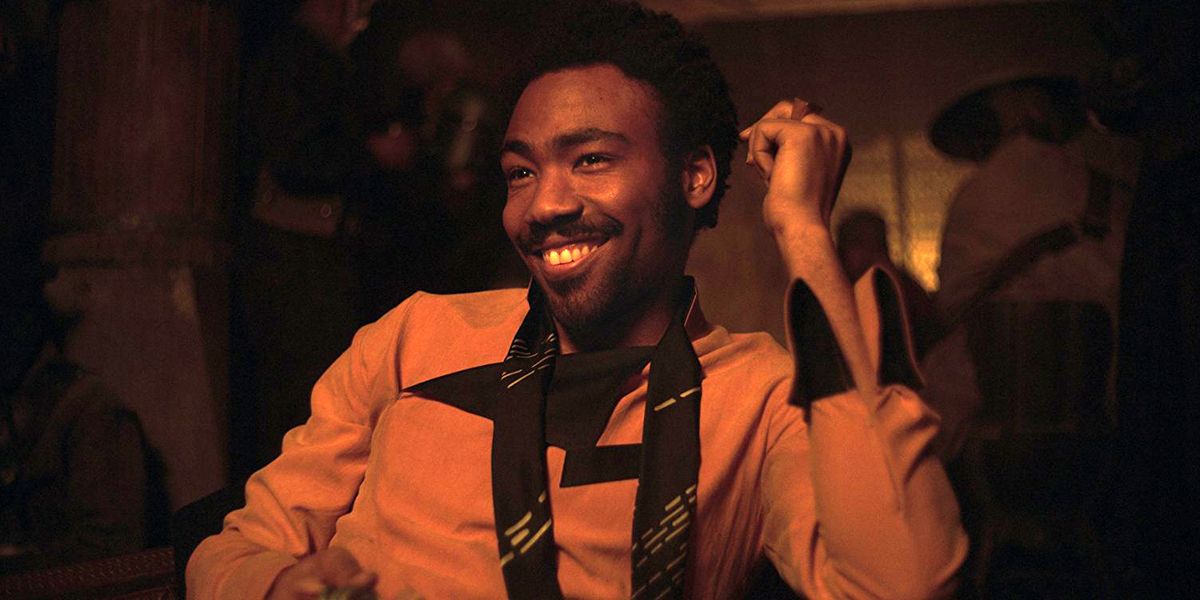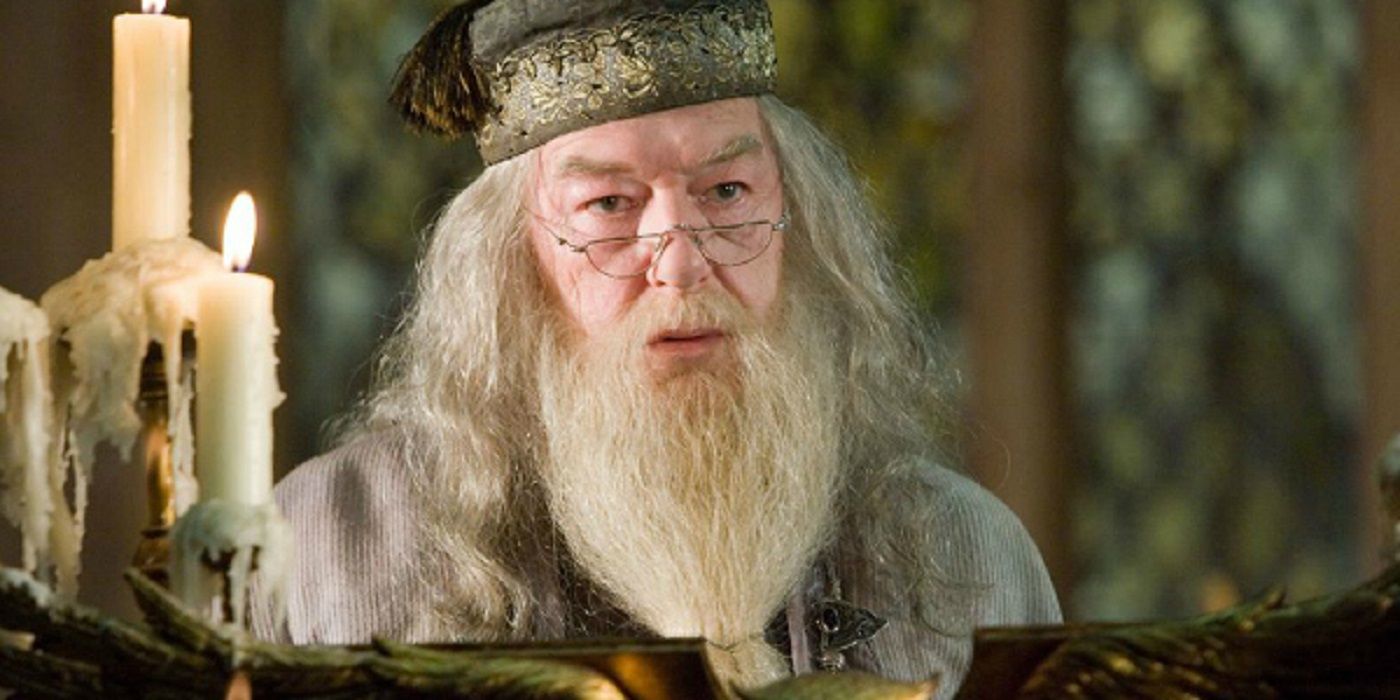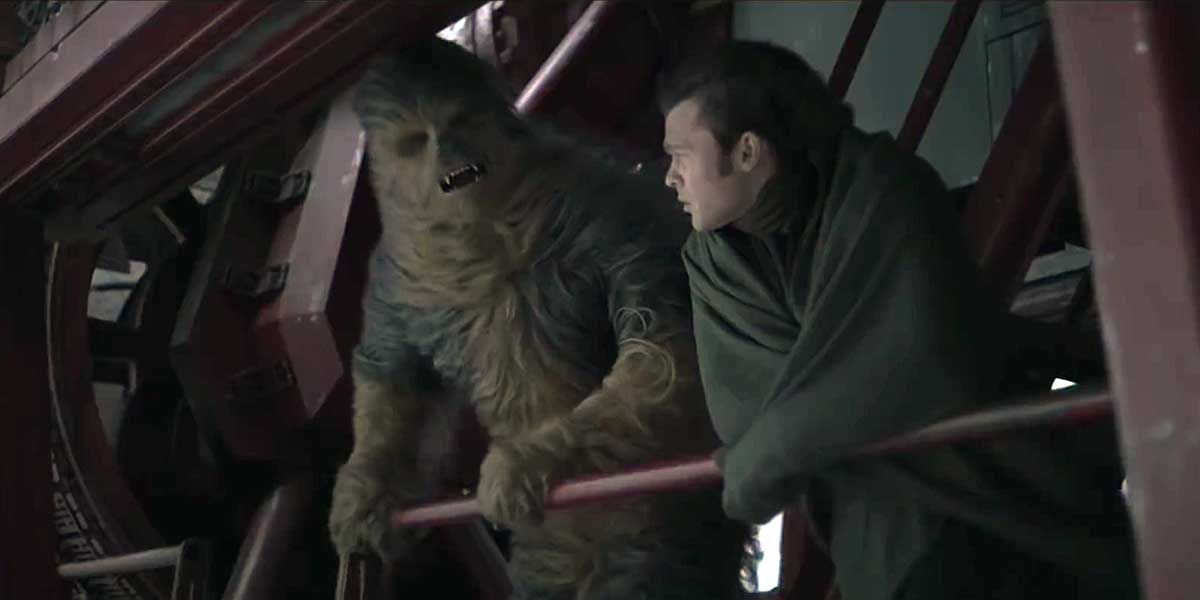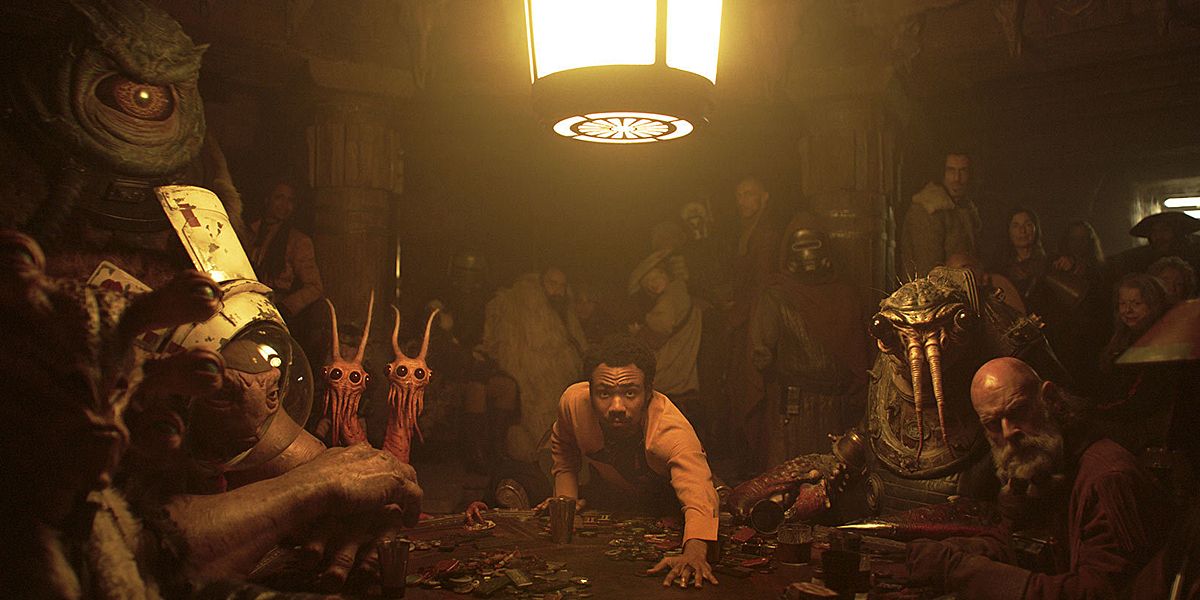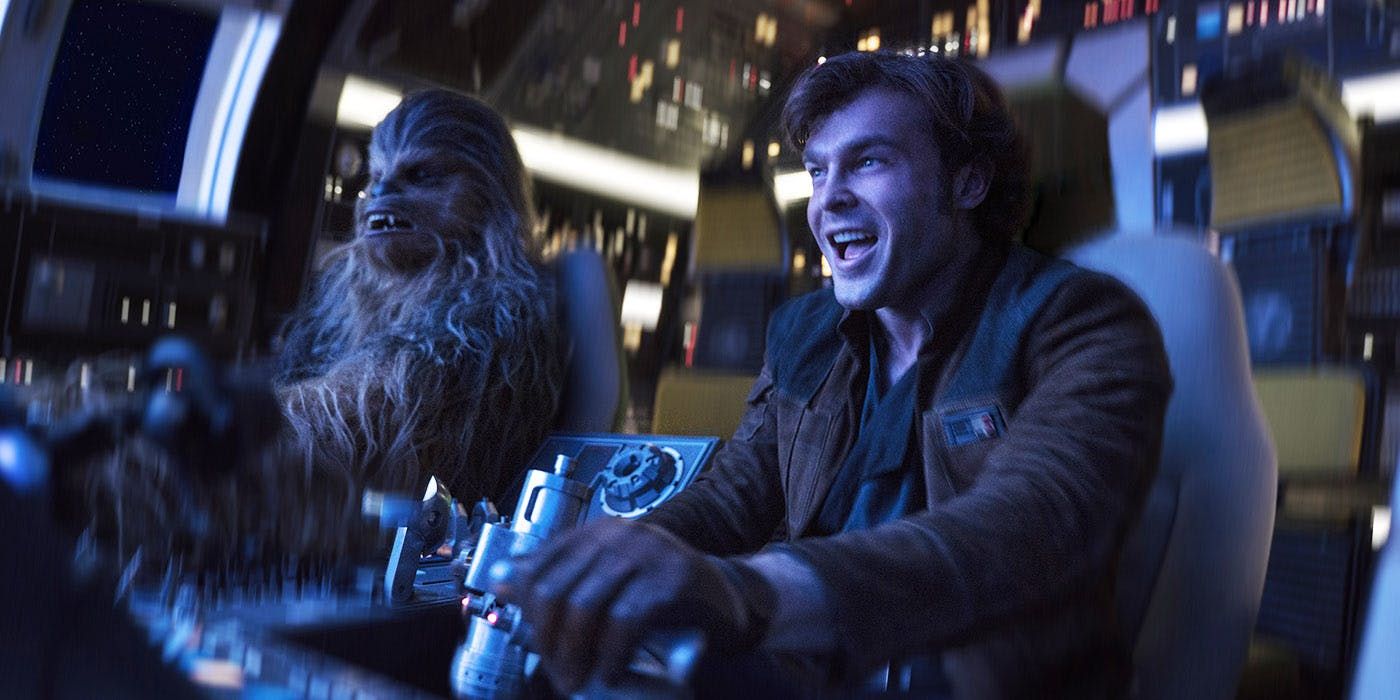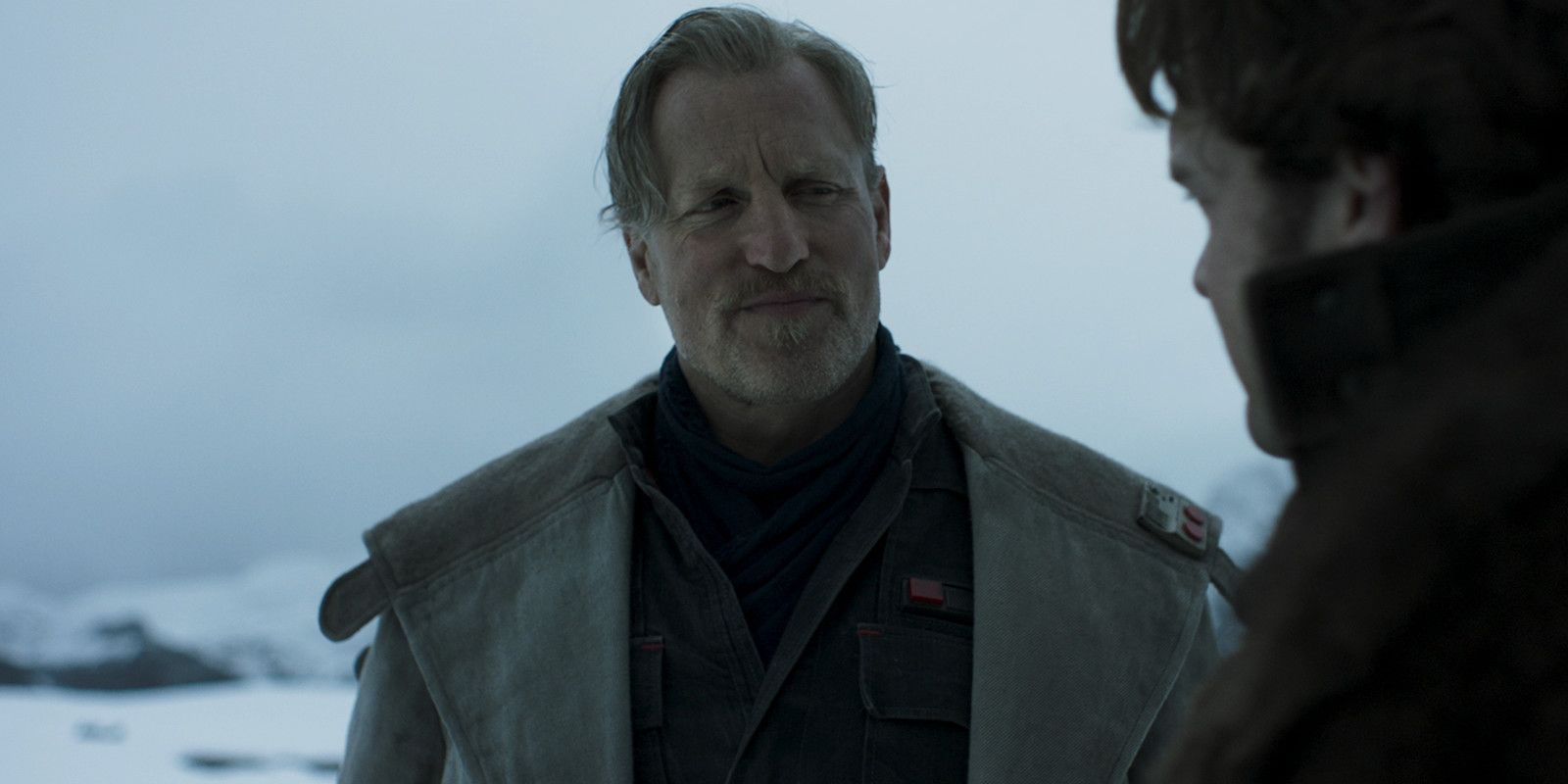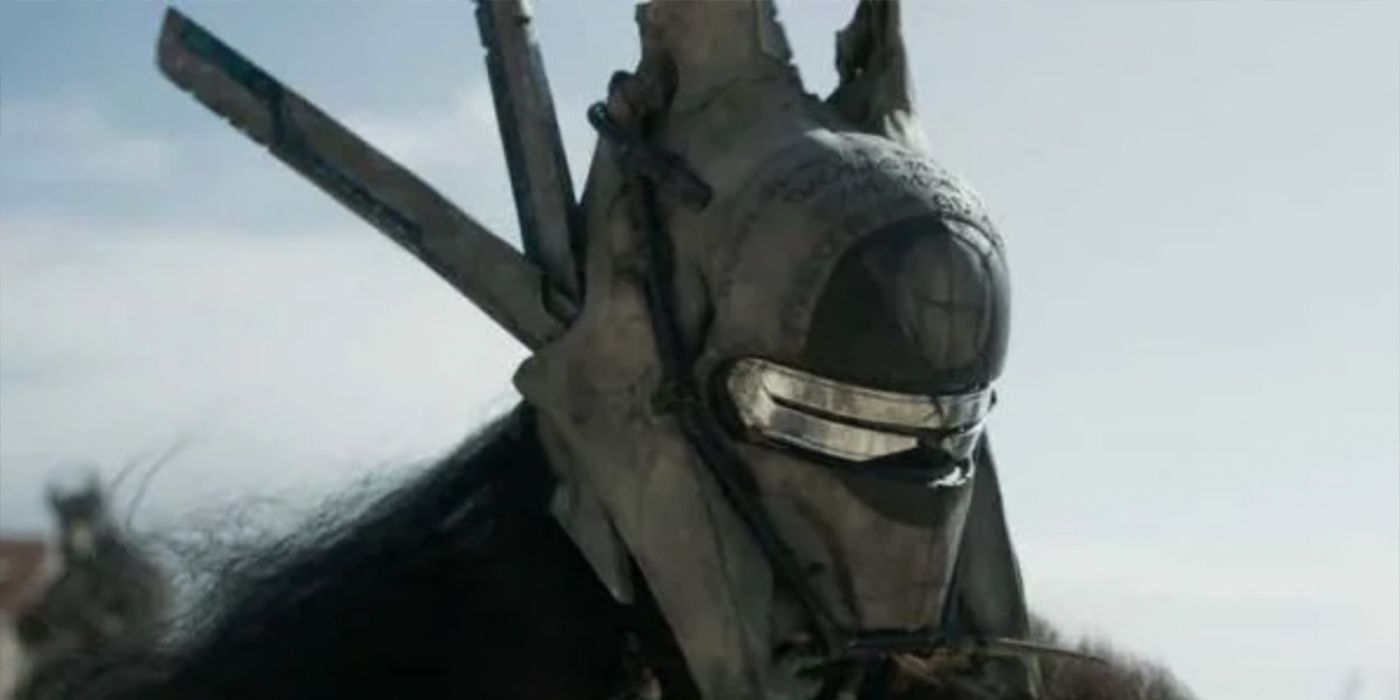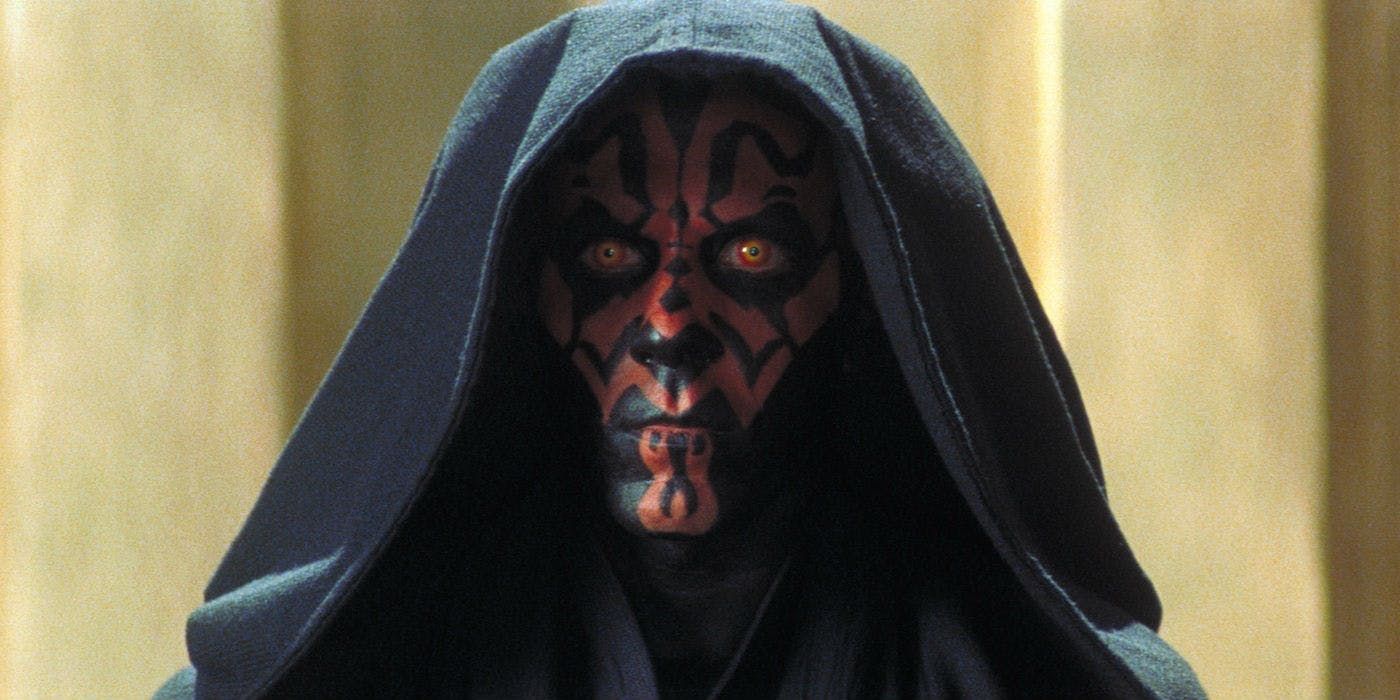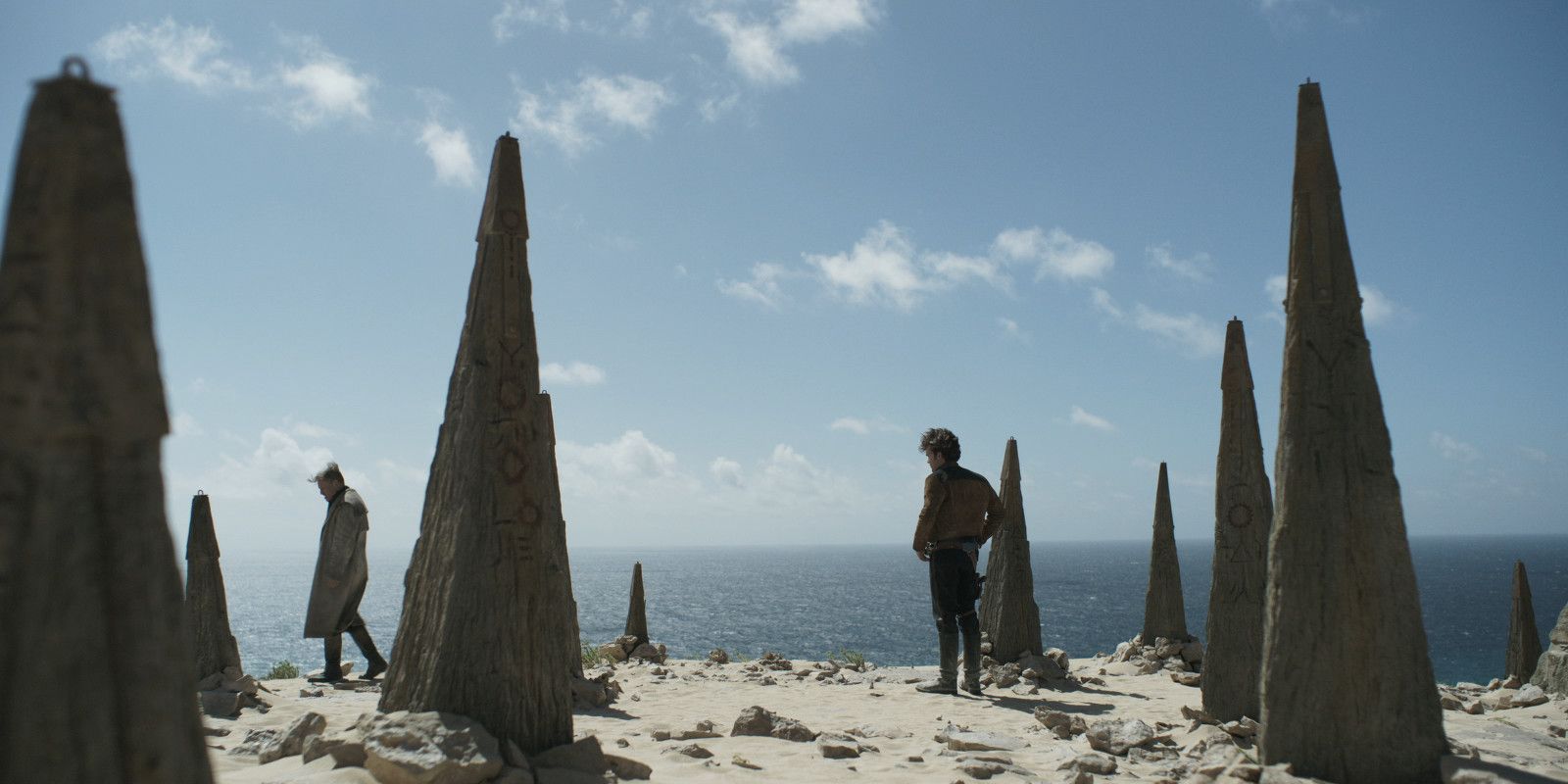Solo: A Star Wars Story is sort of a test for the future of Disney's Star Wars movies. It's only the second of the "Star Wars Story" movies after Rogue One, but unlike Rogue One's self-contained adventure, Solo is clearly hoping for sequels. Solo is also being watched carefully because of the troubling stories which emerged from behind the scenes. Directors Phil Lord and Chris Miller originally ran the show but got fired midway through production for "creative differences." Ron Howard took over and reshot approximately 70% of the film in an extended shoot. Naturally the film arrives with a certain degree of skepticism.
Does Solo prove the skeptics wrong? Yes and no. Unlike certain other blockbusters with production problems, it feels like a cohesive whole, well-made and entertaining. However, it still can't shake a feeling of pointlessness, like this is simply a pleasant well-oiled cog in the Disney moneymaking machine with less in the way of true vision than other Star Wars films. It's hard to imagine anyone full-on hating the movie like some did last year's more ambitious The Last Jedi, but it's also hard to imagine it inspiring the enthusiastic love TLJ also attracted. Here's what worked and what didn't for Solo.
SPOILERS ahead!
15 LOVED: A TRUE SPACE WESTERN
Star Wars has always been, on some level, a Western in space. It's also a whole bunch of other things, of course. The influences of samurai movies, sci-fi B-movie serials, ancient mythology and contemporary politics have always been equally, if not more obvious, than the Western influences. With Solo, the more fantastical and spiritual dimensions of the Star Wars universe are on the sidelines (this is the first Star Wars movie with no reference to The Force, befitting a hero who didn't even believe it existed in A New Hope).
The Earthier (if that's the right word for a movie set in space) focus lends itself to the movie embracing the feel of a Western.
Han Solo himself is very much a "cowboy" sort of character, a wartime deserter who live on the outskirts of the law. He values freedom and personal independence above all else while still holding to a moral code and a will to defend the little guy from dangerous enemies. There's a "wild frontier" quality to the worlds he travels to, and the cinematic influences from classic Westerns are clear (just look at the above screenshot). In the context of the genre, it's narratively in-line with more progressive revisionist Westerns, the "Native American" analogues shown in a more sympathetic light than the troubling stereotypes of older Westerns.
14 HATED: NOT ENOUGH CHARACTER DEVELOPMENT
One of the rumors which inspired the most fear among fans was that Alden Ehrenreich, the young actor playing Han Solo, was completely out of his depth in the role and required an acting coach. It turns out those rumors were overblown (the "coach" in question, Maggie Kiley, was a resource for everyone on set), and sure enough, Ehrenreich gives a very convincing and charismatic performance playing a younger version of the iconic hero. This is a very different sort of character than the Han we met in A New Hope. He's more naive and optimistic, not crushed down by cynicism. Surely seeing how he evolves into the Han we know could be an interesting dramatic arc, right?
Well, that arc isn't in the movie. In fact, as likeable as Ehrenreich's Han is, he barely gets any development at all. Given the movie is filled with huge events that would change a person, it's bizarre how little Han does. The war? Doesn't change him. Repeated screw-ups? Don't phase him. Even being betrayed doesn't seem to phase him much; there might be lip service to learning to be less trusting, but by the credits he still seems to be the same person he was at the beginning of the movie. If all the events of this film aren't what broke him, what was? And would Disney even dare to tell that sure-to-be-depressing story?
13 LOVED: CAPTURES THE FEEL OF LIFE UNDER THE EMPIRE
Star Wars has always been concerned with imperialism, but rarely in the past has it stopped to look at how it ends up affecting the average citizen. The original trilogy was pretty much all focused on the "war" aspect of the conflict between the Rebels and the Empire, which worked for a straightforward good vs. evil story escapist enough to not really think too hard about the real world implications. The prequel trilogy was all about the workings of political manipulations, sometimes perceptively so but of course it was in the context of the poorly written, frequently boring prequel trilogy.
These new "Star Wars Story" films, first Rogue One and now Solo, have been great for getting the ground level perspective on the Empire's workings.
In Solo, we see how the Empire recruits and promotes itself. The propaganda elicits laughs because we know it's all too real that this is how such a regime would sell itself. Interestingly, for all the Empire's promises of order and strict rule of law, they're notably and intentionally inconsistent in how they exercise their rule. When it comes to locking up slaves or separating people at checkpoints, they're on call immediately. Yet the actual crime epidemics of large parts of the galaxy remain unaffected, in fact even supported by the Empire. The gangsters and the Empire benefit each other, sharing similar goals and both benefiting from the populace's fear.
12 HATED: BORING QUESTIONS GET BORING ANSWERS
Was anyone dying to know why Han Solo is named Han Solo? What about how he got his blaster? How about the origins of those dice in the Millenium Falcon? Anyone? Bueller? These are not questions people were dying to know the answers to, and the need to answer questions nobody was really asking is one of the things which makes Solo feel like one of the most pointless Star Wars movies. Maybe if the answers to these questions were actually particularly interesting it could be fun to find out. Instead, the answers are mostly about as dull as the questions themselves.
The story behind Han Solo's name? His first name's "Han," he didn't have a last name and he gave a cheesy speech about being a loner to an Empire recruitment officer, who gave him the last name "Solo." The story behind his blaster? Someone gave it to him (that's literally the answer, and it's not that meaningful except the camera and music cues clearly want it to be). There's at least some effort put into the story of the dice, tying them to symbolic notions of luck and freedom and the romantic subplot, but did any really care that much about Han Solo's dice?
11 LOVED: L3-37 IS THE BEST
Droids are the best, it's as simple as that. BB-8 was arguably the best new character in The Force Awakens. K2-S0 was inarguably the best part of Rogue One. R2D2 might be the best character in the whole series. Sure enough, Solo's biggest scene stealer is L3-37, the droid played by Phoebe Waller-Bridge. Her name might be an awful pun, but L3-37 is a great character of a sort we haven't seen in the Star Wars universe before.
Aside from the pun name, the only complaint you could make about her is that there simply isn't enough of her.
L3-37 is Lando Calrissian's Millenium Falcon co-pilot (and awkward crush), but more than anything, she's an ardent activist for droids' rights. The position of droids in the Star Wars universe has always been one of those weirdly under-thought and vaguely uncomfortable things to take seriously, a class of beings which at least sometimes have full human intelligence yet are still essentially property. Taking those weird "problematic" aspects of the Star Wars world and facing them head-on continues to be a smart creative strategy, following The Last Jedi's take-down of the more questionable parts of Jedi philosophy. L3-37 is funny but also sympathetic, and her joy in liberating her fellow droids is infectious.
10 HATED: THE ROMANCE
Centering a young Han Solo prequel around a romance was always going to be a risky proposition. Han and Leia's love story in the original trilogy is so universally celebrated that it seemed unlikely following one of Han's earlier, inevitably doomed relationships would be as compelling knowing what comes next. In this case, the skeptics were right. Young Han's romance with Qi'ra drives a lot of his motivation and works at minimum passibility on a purely functional plot level, but the emotional connection just isn't there.
Emilia Clarke tries her best playing Qi'ra given the material, but that material just ends up feeling hackneyed. Her "dark secret" is so blatantly and obviously foreshadowed there's no real impact when it's revealed, and the instant fake-out "redemption" negates an emotional impact the initial "betrayal" experience might leave on him (he leaves before it's conclusively revealed she is in fact on the Dark Side). Perhaps finding out she's evil could be a hook for a sequel, but it leaves the story in this movie feeling toothless. Scenes which call back directly to Han and Leia's scenes in The Empire Strikes Back are supposed to be fan service but instead work as a reminder you could be watching a much better love story instead of this one.
9 LOVED: DONALD GLOVER AS LANDO
Can Donald Glover do anything wrong? He can, but he does so many things so utterly brilliantly that it's no wonder people are so in love with the man. Coming off the heels of Atlanta's second season and the sensation of the "This is America" music video, the actor/writer/musician is now enjoying his biggest movie role yet as the young Lando Calrissian in Solo. As you might expect, he nails it. Playing his role closer to Billy Dee Williams' performance than Alden Ehrenreich's is to Harrison Ford's, he nonetheless makes the part his own.
More than anyone else in the film, Glover really seems to be having fun.
The levity he brings to the proceedings feels like it might be the strongest remnant of what one imagines Phil Lord and Chris Miller's more comical vision of Solo might have been like. His relationship with L3-37, given just a few scenes worth of attention, is more compelling than the entirety of the Han-Qi'ra romance. Kathleen Kennedy has already talked about a Lando movie as a possibility for the future. Based on his part in Solo, audiences might actually be more hyped for Lando: A Star Wars Story than for Solo 2!
8 HATED: THE DUMBLEDORE EFFECT
At this point it's become a cliche: before the release of a big new movie, somebody involved in the production, an actor or writer or director, tells the press that so-and-so in the new movie is supposed to be somewhere in the LGBTQ spectrum. Cue lots of fan-art from those supportive and rants about "SJWs ruining Hollywood" from those who don't. Then the movie comes out, and aside from maybe a couple flirty lines or a longing glance, there's absolutely zero indication in the movie of this aspect of the character. Such is the case with Lando and his "pansexuality."
Back in 2007 when J.K. Rowling announced Dumbledore was gay after the whole Harry Potter book series was finished, this was at least somewhat progressive, considering the near complete taboo on including queer characters in children's entertainment. Today in the age of Steven Universe and Star Trek Beyond, though, the sheer reluctance of studios to put their money where their mouths are and actually acknowledge the existence of queer characters within their actual movies is tiring. Lando might be pansexual, but from the movie alone you could only guess (L3-37 might make fun of Lando for "flirting" with Han in one scene, but honestly, Chewie comes off as a bigger flirt towards Han than Lando does).
7 LOVED: MEETING CHEWBACCA
How do you not love Chewbacca? The future medal snubbee and Porg chef is one of the most beloved characters in the Star Wars universe. If there's one thing Solo absolutely had to get right, it's the start of Han's long-lasting friendship with Chewie. Thankfully, the movie nails this important aspect. Chewie's introduction scene is one of the rare times Solo uses a callback to prior Star Wars films in a way that's actually meaningful. Setting up Han's encounter with a "monster" similarly to the Rancor pit scene in Return of the Jedi, only for the "monster" he meets to be Chewie, works as a clever subversion of expectations that enhances the movie's morals about challenging prejudice.
We're reminded that the Wookiees faced especially brutal oppression under the Empire, and that Chewie has more reason that anyone to be fighting them.
As he teams up with Han, first as a way to escape captivity but eventually blossoming into a true friendship, he also gets to rescue other members of his own kind. One (arguable) disappointment in regards to Chewie's role in the movie: while his family is discussed, the rumors we'd see them on-screen for the first time since The Star Wars Holiday Special turned out to be false. Not that people want to be reminded of The Star Wars Holiday Special, but wouldn't it be fun to see the team at Lucasfilm find creative ways to redeem the less-beloved parts of Star Wars? Still waiting on that Jar Jar: Sith Lord epic.
6 HATED: OVERLY DARK VISUALS
Bradford Young, the Oscar-nominated cinematographer of Selma and Arrival, is certainly talented at his craft, and Solo isn't without its moments of visual splendor. It's less clear, however, just what the thought process behind his general aesthetic for the movie was. It's not as if this was one of the things that changed based on the director; it's not like Justice League where you can tell the difference between a Zack Snyder scene and Joss Whedon scene on lighting alone. Young goes for a grimy, gritty look in Solo. On some level it makes sense because we're dealing with the seedier corners of the Star Wars universe. Stylistically, though, it feels at odds with the more lighthearted tone of the movie.
Frequently the imagery is so dark and blurry on-screen that you can barely make out the details. Considering much of the fun of the Star Wars movies has always been noticing the fun details in the corner of the frame, it's a questionable choice. It's possible to get the mood Solo's cinematography seems to be going for while still be visually clearer. The original A New Hope took place in a lot of gritty settings, but you could always tell what you were looking at. Even Rogue One, the darkest of the Star Wars movies, wasn't so consistently literally dark.
5 LOVED: THE KESSEL RUN
If the Star Wars Story movies are all going to be based in filling in minor plotholes from the original trilogy, let's be grateful they're having so much fun doing it. In Solo you get your nerdy explanation for why Han described his Kessel Run using a metric of distance rather than time, but you also get an amazing action scene out of it that's far and away the most fun part of the movie. The centerpiece of the film's second act, the Kessel Run sequence is when the movie truly comes alive.
The film's second act is its best part, and the main reason such a mixed bag of a movie still averages out to recommended viewing.
From the mission to retrieve precious coaxium fuel in the Kessel spice mines, which ends up involving a full-blown slave rebellion, to the daring spaceship escape dodging asteroids, TIE fighters, monsters and black holes, the film's second act is its best part, and the main reason such a mixed bag of a movie still averages out to recommended viewing. It's a thrilling and joyous stretch of action where everything that could go wrong does go wrong yet our heroes still manage to beat the odds by the slimmest possible margin. Young Han is certainly naive to "have a good feeling about this," but the audience certainly isn't.
4 HATED: LACK OF A GREAT VILLAIN
Being a smaller scale story, Solo didn't necessarily need a villain akin to Darth Vader, Palpatine or Kylo Ren. But couldn't it have had somebody more interesting than the villains we got? The lack of a great villain might be one of the sacrifices made due to the production schedule. Originally Dryden Vos, the film's main antagonist, was going to be very different, a CGI bear-like alien played by Michael K. Williams, but the reshoot schedule required Williams drop out of the film and the original plans be changed. In his place, we have Paul Bettany as a humanoid gangster. Bettany gives an acceptable performance, but there's just not much memorable substance to the character.
There are also a couple of characters who start off as teammates of Han's but turn out to be bad guys, Qi'ra and Tobias Beckett, the mentor figure played by Woody Harrelson. The problems with Qi'ra's story (the overdone foreshadowing, the lack of any real dramatic consequences within this particular film) have already been discussed earlier in this article. As for Beckett, the main weakness is relying too much on a recognizable star rather than creating a unique character. Throughout the movie you just think of him as "Woody Harrelson," something which typically doesn't happen in the better Star Wars movies.
3 LOVED: ENFYS NEST
The role of Enfys Nest is the only truly surprising aspect of Solo's story, and it's a pleasant one. Common Star Wars wisdom presumes mask + role as a "pirate" + fighting the protagonists = bad guy, but that's not the case here. Instead, Enfys Nest turns out to be the most truly heroic character in the movie, interfering in Han's heists for the sake of fighting gangsters like Dryden Vos and supporting the early stages of the Rebellion.
It's a twist that manages to give this otherwise lightweight story some true meaning within Star Wars continuity.
Enfys doesn't fully bring Han into the Rebellion (that really wouldn't fit with his characterization at the beginning of A New Hope and the presumed development in that direction), but she does help nudge his moral compass to do the right thing at least this one time. The casting of biracial actress Erin Kellyman also manages to ease a potential concern from earlier in the film. Before the Enfys reveal, it appeared as if Thandie Newton's Val was both the first and only significant black woman in the Star Wars movies, and killing her off so quickly would have struck a sour note were it not for Enfys' powerful presence.
2 HATED: THE SURPRISE CAMEO
A lot of people want Phil Coulson to show up in one of the Marvel movies again. If the TV show Agents of S.H.I.E.L.D. takes place in the same universe as the movies and references them regularly, why can't the movies reference the show? On some levels, the desire makes sense. The end of Solo, however, works as a sort of argument against bringing Coulson into an MCU movie. As far as moviegoers who don't pay attention to Agents of S.H.I.E.L.D. are concerned, Coulson died in The Avengers, and dealing with the whole not being dead thing would just be confusing. So it is with the big surprise Darth Maul cameo at the end of Solo.
As far as most moviegoers are concerned, Darth Maul died when he got sliced in half in The Phantom Menace. He turned out to live a lot longer than that in the Clone Wars and Rebels animated series where he's a much better villain than he was in the movie, but most of the people watching the Star Wars movies haven't followed the cartoons. The Maul cameo might be fan service for some, but for at least as many it will elicit a "Really?" Even beyond that concern, the cameo just feels kind of tacky, so blatantly an attempt at a sequel hook that it mostly just reminds you how little stuff of substance actually happened in this first Solo movie.
1 LOVED: HAN SHOT FIRST
Some fanservice moments, however, just simply work. So it is with the final showdown between Han and Beckett, in which Han shoots first. The whole "Han shoots first" vs. "Greedo shoots first" debate has been going on ever since George Lucas edited together the Star Wars Special Editions in 1997. Originally excused as a concession to changing MPAA standards, Lucas would later defend the "Greedo shoots first" edit as being more true to how he envisioned Han as a character. Many fans disagreed, feeling Han being the type to shoot first is important to his harder-edged character. Among these fans happen to be director Ron Howard and screenwriter Lawrence Kasdan.
More than anything, it's just a satisfying moment for anyone who ever rolled their eyes at George Lucas.
After several knowing scenes throughout the movie where Han ends up holding back from shooting enemies, the final duel between Han and his untrustworthy former mentor has Han shooting first before his opponent has even grabbed his weapon. It's this scene in which we find Han at his closest to his original A New Hope character, the strongest evidence that he'll eventually become that man in the future. More than anything, it's just a satisfying moment for anyone who ever rolled their eyes at George Lucas' increasingly questionable decisions regarding his own series.

